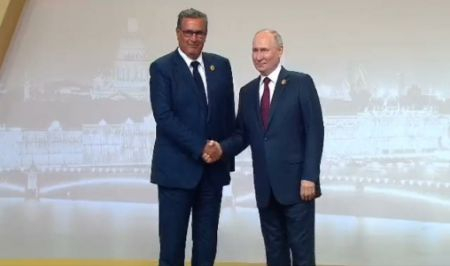2nd Russia-Africa Summit Confirms Principle of Participation Limited to UN-Recognized States of the Continent
By solemnly inviting to its summit, for the second consecutive time, the only African states that enjoy official recognition on its part, Russia has irreversibly enshrined the principle of participation limited to African countries recognized by the United Nations. In fact, Russia has invited all the African states with which it has bilateral relations, and which are recognized by the UN, despite the pressure exerted by certain countries, such as South Africa and Algeria, abusing their friendship with Moscow to impose any participation by the “polisario” at this summit. The Russian decision, adopted sovereignly for the second time in succession, is therefore not a position dictated in the urgency of the moment for the needs of the event in question. It is now understood as an unambiguous principle of participation restricted to UN-recognized African states, backed by all the legal and diplomatic guarantees governing the organization of this summit and beyond. This is borne out by all the documents adopted at the end of the summit, notably the four declarations and the action plan, which clearly and unequivocally enshrine the participation format. Indeed, the introductory paragraph of all these official documents uses the following wording: “We, the Heads of State and Government of the Russian Federation and the African States recognized by the United Nations (hereinafter referred to as the Russian Federation and the African States) and representatives of the African Union and leading African integration organizations.” This principle, solemnly enshrined in the official working documents of this major Russian-African meeting, clearly and definitively establishes that only the 54 member states of the African Union recognized by the UN are members of this summit. Russia’s decision stands in stark and unequivocal contrast to the one adopted by the European Union, which, under the French Presidency, had, in violation of international law, invited the leader of the “polisario” to the EU-AU Summit held in Brussels in February 2022. Moreover, the contested and questionable presence of the head of the “polisario” militia had undermined the seriousness of this famous meeting and caused embarrassment and disapproval in many of the countries present, outraged by the fact that the EU had tolerated the participation of this individual being prosecuted by several European courts for war crimes and human rights violations. The EU, which regards Morocco as a strategic and privileged partner, allowed itself to be inflicted with a troublesome intruder. Although neither its institutions nor its member states recognize the latter, the EU paradoxically acquiesced by offering a folding seat at the Brussels summit to a notorious criminal, who has denounced the UN-sponsored ceasefire agreement and threatens Morocco’s security and, beyond that, peace and stability in the EU’s immediate vicinity. Jealous of the territorial integrity of its member states in the face of the separatist pressures that spare almost none of them, the EU should be just as jealous of the security and stability of Morocco, which it considers – quite rightly – to be a strategic and privileged partner. In other words, firmness and intransigence on matters of principle is a choice that pays off. Several of Morocco’s partners have made this choice. Russia, which took the plunge in 2019, is now sticking to its commitments.

